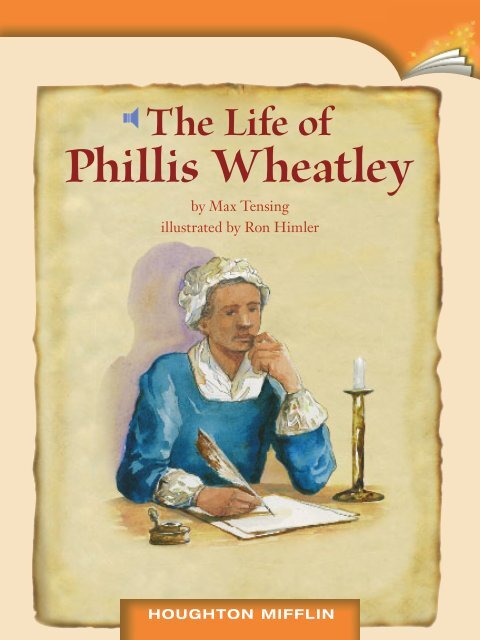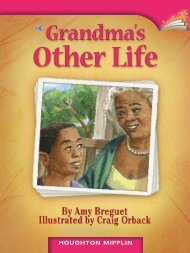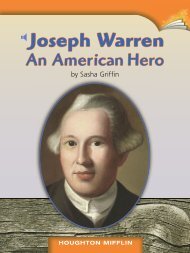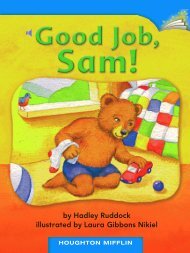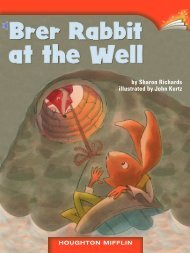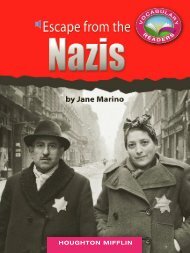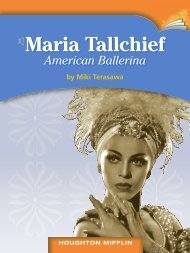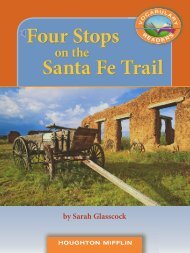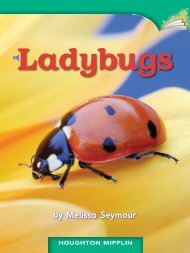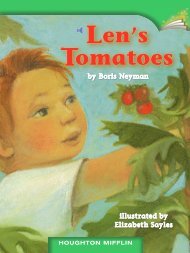Lesson 15:The Life of Phillis Wheatley
Lesson 15:The Life of Phillis Wheatley
Lesson 15:The Life of Phillis Wheatley
Create successful ePaper yourself
Turn your PDF publications into a flip-book with our unique Google optimized e-Paper software.
<strong>The</strong> <strong>Life</strong> <strong>of</strong><strong>Phillis</strong> <strong>Wheatley</strong>by Max Tensingillustrated by Ron HimlerHOUGHTON MIFFLIN
<strong>The</strong> <strong>Life</strong> <strong>of</strong><strong>Phillis</strong> <strong>Wheatley</strong>by Max Tensingillustrated by Ron HimlerPHOTOGRAPHY CREDITS: 16 © North Wind Picture Archives/Alamy.Copyright © by Houghton Mifflin Harcourt Publishing CompanyAll rights reserved. No part <strong>of</strong> this work may be reproduced or transmitted in any form or by any means, electronic ormechanical, including photocopying or recording, or by any information storage and retrieval system, without the priorwritten permission <strong>of</strong> the copyright owner unless such copying is expressly permitted by federal copyright law. Requestsfor permission to make copies <strong>of</strong> any part <strong>of</strong> the work should be addressed to Houghton Mifflin Harcourt School Publishers,Attn: Permissions, 6277 Sea Harbor Drive, Orlando, Florida 32887-6777.Printed in ChinaISBN-13: 978-0-547-02282-6ISBN-10: 0-547-02282-41 2 3 4 5 6 7 8 0940 18 17 16 <strong>15</strong> 14 13 12 11If you have received these materials as examination copies free <strong>of</strong> charge, Houghton Mifflin Harcourt School Publishersretains title to the materials and they may not be resold. Resale <strong>of</strong> examination copies is strictly prohibited.Possession <strong>of</strong> this publication in print format does not entitle users to convert this publication, or any portion <strong>of</strong> it, intoelectronic format.
An Unusual MeetingIn 1776, <strong>Phillis</strong> <strong>Wheatley</strong> was 23 years old. Thatspring, she left her home in Boston, Massachusetts. Shetraveled to nearby Cambridge. This happened during theearly days <strong>of</strong> the Revolutionary War. At that time, goingon even a short trip was difficult. But <strong>Phillis</strong> <strong>Wheatley</strong>’sjourney was worth the trouble. She had been invited tomeet George Washington. <strong>The</strong> meeting was unusual forthree reasons.First, men did not usually listen to women’s opinionsabout politics and public affairs. Women were not usuallyinvited to meet with important leaders.Secondly, <strong>Phillis</strong> <strong>Wheatley</strong> was black. Until two yearsbefore, she had been enslaved. She had worked for a wellknownBoston family. She was freed just before hermistress died. Free and formerly enslaved blacks weretreated somewhat better in New England than in theSouth. Even so, a formal meeting between a black womanand the leader <strong>of</strong> the Continental Army was not common.Finally, the others waiting to see Washington werebusinessmen or politicians. <strong>The</strong>se men gave money andsupplies to help the war effort. <strong>Phillis</strong> <strong>Wheatley</strong> was therebecause <strong>of</strong> a poem.<strong>Phillis</strong> wrote several poems in favor <strong>of</strong> the Revolution.A few months earlier, she sent a poem to Washington. <strong>The</strong>poem was titled, “To His Excellency General Washington.”2
<strong>The</strong> poem said Washington was a good leader. Washingtonwrote back to <strong>Phillis</strong>. His letter said, “If you should evercome to Cambridge,[…] I shall be happy to see a person s<strong>of</strong>avored by the Muses.” That was a fancy way <strong>of</strong> saying heliked her poetry and wanted to meet her.We can only guess about <strong>Phillis</strong> <strong>Wheatley</strong>’s feelingsthat day. She might have worried about her dress. Perhaps itwas too plain. She might have worried about being nervous.Perhaps she would be too nervous to speak. Or she mighthave looked back on her life and been amazed. So manydifferent things had happened to her. Now she was withsome <strong>of</strong> the most powerful men in America.<strong>Phillis</strong> <strong>Wheatley</strong> waits to meet General George Washington.3
Stolen from AfricaWe know very little about <strong>Phillis</strong> <strong>Wheatley</strong>before she was kidnapped and sold into slavery. Aperson who wrote about <strong>Phillis</strong> said that she told onlyone story from her life in Africa. In the story, <strong>Phillis</strong>’smother kneeled and bowed. In this way, <strong>Phillis</strong>’smother began the new day. This was a Muslim custom.It came from the Fulani tribe. <strong>The</strong> Fulani tribe livedon the west coast <strong>of</strong> Africa. <strong>Phillis</strong>’s story has helpedresearchers figure out where she probably came from.We also know that <strong>Phillis</strong> was brought to Bostonon a slave ship. It arrived during the summer <strong>of</strong> 1761.<strong>The</strong> journey was very hard. <strong>Phillis</strong> arrived scared andsick. She had only one piece <strong>of</strong> fabric as clothing.<strong>Phillis</strong> waited on the Beach Street wharf. She did notknow what would happen next. She was about sevenyears old.Everything about Boston was new to <strong>Phillis</strong>. <strong>The</strong>sights, sounds, and smells were different. Her home inAfrica was remote and rural. But Boston was a big city.Horses pulled carriages. Large brick houses stood oneither side <strong>of</strong> cobblestone streets. <strong>The</strong> peal, or ringing,<strong>of</strong> church bells and the cries <strong>of</strong> seagulls could be heard.4
<strong>The</strong> seagulls seemed to be mocking the fishermen. Smells<strong>of</strong> tea, c<strong>of</strong>fee, and spices filled the air. <strong>The</strong> people spoke alanguage <strong>Phillis</strong> did not understand. Everyone dressedvery strangely. Some <strong>of</strong> the men had powdered wigs. <strong>The</strong>women wore fancy gowns with many petticoats undertheir skirts.<strong>Phillis</strong> arrives at the Beach Street wharf in Boston.5
One <strong>of</strong> these women was Susanna <strong>Wheatley</strong>. Shecame to the wharf with her husband, John. <strong>The</strong> <strong>Wheatley</strong>shoped to buy a girl to work in their house. <strong>The</strong>y alsohoped the girl would be a friend to Mrs. <strong>Wheatley</strong> as shegrew old. Mrs. <strong>Wheatley</strong> chose <strong>Phillis</strong>. She thought that<strong>Phillis</strong> looked intelligent, gentle, and modest. <strong>The</strong>sequalities helped Mrs. <strong>Wheatley</strong> ignore the fact that<strong>Phillis</strong> was so young. So the <strong>Wheatley</strong>s bought theyoung girl. <strong>The</strong>y called her <strong>Phillis</strong>, after the name<strong>of</strong> the ship that brought her to North America.<strong>The</strong> <strong>Wheatley</strong>s had a nice house and a comfortable life.6
<strong>Life</strong> with the <strong>Wheatley</strong>s<strong>The</strong> <strong>Wheatley</strong>s were different from many otherfamilies who might have chosen <strong>Phillis</strong>. This was the firstgood luck <strong>Phillis</strong> had since being taken from her home inAfrica. <strong>The</strong> <strong>Wheatley</strong>s lived in a large house on a busyBoston street. John was a successful businessman. <strong>The</strong>family lacked for nothing.<strong>The</strong> <strong>Wheatley</strong>s were rich. But more important wastheir attitude toward enslaved people. <strong>The</strong> <strong>Wheatley</strong>s’religion taught them to treat enslaved blacks as part <strong>of</strong>the family. <strong>Phillis</strong> never had to do tedious chores. Shehad a special place in the family. Mrs. <strong>Wheatley</strong>’sdaughter, Mary, wanted to be a teacher. Mary personallytaught <strong>Phillis</strong> how to read and write English.Perhaps Mary was a very good teacher. Perhaps<strong>Phillis</strong> was a very good student. Whatever the reason,<strong>Phillis</strong> learned very quickly. She did not speak Englishwhen she came to Boston. A year later, she was able tospeak English well. She could also read and write.Mary also taught <strong>Phillis</strong> astronomy, history, math,poetry, geography, and Latin. <strong>Phillis</strong> was like a sponge.She soaked up all the knowledge she could.7
People thought the things <strong>Phillis</strong> accomplishedwere amazing. At that time, most Americans thoughtthat Africans could not learn as well as white colonists.Some people believed that Africans could not learn atall. Of course, these people rarely tried to teachenslaved Africans.<strong>Phillis</strong> <strong>Wheatley</strong> proved many people werewrong. She worked very hard at her studies. Shewanted to learn. She soon had a better educationthan many free girls in the colonies did.<strong>Phillis</strong> <strong>Wheatley</strong> was eager to learn all she could.8
<strong>Phillis</strong> <strong>Wheatley</strong> did not eat at the same table with the other guests.<strong>Phillis</strong> faced obstacles to becoming educated. But shesucceeded. Social obstacles were a bigger problem. Sometimeswealthy Boston families invited <strong>Phillis</strong> to their homes.At these gatherings, people talked with <strong>Phillis</strong> about manytopics. But, because <strong>Phillis</strong> was black, she was not allowed toeat at the same table with the other guests.At the same time, <strong>Phillis</strong> was not allowed to speakfreely with other enslaved people. One day, Susanna<strong>Wheatley</strong> sent an enslaved man named Prince to get <strong>Phillis</strong>.When they arrived at home, Mrs. <strong>Wheatley</strong> learned that<strong>Phillis</strong> had sat with Prince on the carriage driver’s seat. Mrs.<strong>Wheatley</strong> became angry with Prince. She said <strong>Phillis</strong> shouldhave been inside the carriage. Eventually <strong>Phillis</strong> did becomefriends with another enslaved girl, Obour Tanner. But<strong>Phillis</strong> must have felt trapped between two worlds.9
A Poet Is Born<strong>Phillis</strong> <strong>Wheatley</strong> loved to write. By the time she was 12,she was writing letters. She exchanged letters with thesmartest people in Boston. <strong>Phillis</strong> began to write poetry aswell. At first, she mimicked the style <strong>of</strong> writing <strong>of</strong> a favoritewriter, English poet Alexander Pope.Alexander Pope (1688–1744) was famous for writing“heroic couplets.” In this style <strong>of</strong> writing, poets tell astory with pairs <strong>of</strong> rhyming lines.“In Wit, as Nature, what affects our heartsIs not th’ exactness <strong>of</strong> peculiar parts;`Tis not a lip, or eye, we beauty call,But the joint force and full result <strong>of</strong> all.”This example <strong>of</strong> heroic couplets comes from AlexanderPope’s “An Essay on Criticism.”One day, two friends visited the <strong>Wheatley</strong>s. <strong>The</strong>friends were Mister Hussey and Mister C<strong>of</strong>fin. <strong>The</strong>y camefrom Nantucket Island. During dinner, the men told thestory <strong>of</strong> their trip to Boston. <strong>The</strong> ship had almost sunk ina storm. <strong>The</strong> men had almost died. <strong>Phillis</strong> listened closelyto their story. A few days later, she wrote a poem about thestory. Susanna <strong>Wheatley</strong> liked the poem. She sent it to anewspaper editor. <strong>The</strong> editor also liked the poem. In 1767,10
the newspaper printed “On Messrs. Hussey and C<strong>of</strong>fin.”It was <strong>Phillis</strong>’s first published poem. She was just 14years old.<strong>Phillis</strong> continued to write poetry. She wrote poemsabout events that led to the American Revolution. Shewrote about the Stamp Act. With this act, Britain taxedAmerican colonists for printed paper. Many colonists feltthat the tax was unfair. <strong>Phillis</strong> also wrote a poem about theBoston Massacre. At this event, British soldiers shot atprotesters. Another poem was about a boy who was killedby a British Loyalist.<strong>Phillis</strong> <strong>Wheatley</strong> wrote a poem about how Mister Hussey andMister C<strong>of</strong>fin almost died at sea in a storm.11
<strong>Phillis</strong> <strong>Wheatley</strong>summons, or thinks<strong>of</strong>, new ideas for apoem.<strong>The</strong> Book<strong>The</strong> teachings <strong>of</strong> George Whitefield were important to<strong>Phillis</strong> <strong>Wheatley</strong>. Whitefield was a minister in England. Hewrote that slavery was wrong. Whitefield traveled to America.He shared his ideas throughout New England. Mrs. <strong>Wheatley</strong>met him. She agreed with his ideas. When Whitefield died,<strong>Phillis</strong> wrote a poem about him. Many people in bothEngland and America thought the poem was beautiful. InLondon, the poem was read by the Countess <strong>of</strong> Huntingdon,who supported Whitefield. <strong>The</strong> countess was grateful to<strong>Phillis</strong> for her kind words about Whitefield. Suddenly, <strong>Phillis</strong>became an internationally famous poet. Susanna <strong>Wheatley</strong>felt it was time to publish a book <strong>of</strong> <strong>Phillis</strong>’s poems.12
It was difficult for any writer to publish a book in the1770s. But it was even more difficult for <strong>Phillis</strong> <strong>Wheatley</strong>to publish her poems. No publisher believed an enslavedperson could write such poems. Susanna <strong>Wheatley</strong> decidedto organize a group <strong>of</strong> important people in Boston. <strong>The</strong>ywould say that <strong>Phillis</strong> did write the poems.<strong>Phillis</strong> <strong>Wheatley</strong> met with 18 important men fromBoston. Among them was John Hancock, the governor<strong>of</strong> Massachusetts. He would later sign the Declaration <strong>of</strong>Independence. We do not know exactly what happenedat this meeting. But <strong>Phillis</strong> must have done a good job.All the men signed the letter that said she wrote thepoems. She would soon publish a book.This is part <strong>of</strong> the letter that said <strong>Phillis</strong> had written the poems.~ • ~ • ~ • ~ • ~ • ~ • ~“…<strong>The</strong> Poems specified in thefollowing Page[s] were (as we verilybelieve) written by PHILLIS, a youngNegro Girl, who was but a few Yearssince, brought… from Africa, and hasever since been, and now is, under theDisadvantage <strong>of</strong> serving as a Slave in aFamily in this Town.”13
Journey to EnglandEven with the letter, no American would publish apoetry book by an enslaved person. So Susanna <strong>Wheatley</strong>wrote to the Countess <strong>of</strong> Huntingdon. <strong>The</strong> countess agreedto pay for the book to be published in London. This was notthe most efficient way <strong>of</strong> publishing a book. But Susanna<strong>Wheatley</strong> wanted <strong>Phillis</strong> to succeed. So <strong>Phillis</strong> boarded aship. <strong>The</strong> <strong>Wheatley</strong>s’ son went with her. <strong>The</strong> ship went toEngland. <strong>The</strong> English welcomed <strong>Phillis</strong>, even though shewas still enslaved. England’s most important familieswanted to meet <strong>Phillis</strong>. She was even supposed to meetKing George III!But before <strong>Phillis</strong> could meet the king, she got a messagefrom Boston. Susanna <strong>Wheatley</strong> was dying. <strong>Phillis</strong> got on thefirst ship home.Susanna <strong>Wheatley</strong> died in the spring <strong>of</strong> 1774. Shelived to see <strong>Phillis</strong> publish a book. Mrs. <strong>Wheatley</strong> wasmodest to the end <strong>of</strong> her life. She asked <strong>Phillis</strong> not to writea poem about her death.<strong>Phillis</strong> did not write a poem about Susanna <strong>Wheatley</strong>’sdeath. But we know that <strong>Phillis</strong> was very sad. She wrote toa friend about her sadness. “I have lately met with a greattrial in the death <strong>of</strong> my mistress… I was treated by hermore like a child than her servant.”14
Before his wife’s death, John <strong>Wheatley</strong> freed <strong>Phillis</strong>from slavery. <strong>Phillis</strong> had overcome many challenges. Shewas the first enslaved female African to publish a book.And now she was a free woman as well.<strong>The</strong> General Will See You NowAs <strong>Phillis</strong> <strong>Wheatley</strong> sat in George Washington’swaiting room, perhaps she thought <strong>of</strong> these events in herlife. <strong>The</strong>n <strong>Phillis</strong> was called in to see General Washington.Everyone else in the room had to wait. <strong>Phillis</strong> andWashington might have talked about the war, books, or<strong>Phillis</strong>’s poetry. We don’t know for sure. Washington spenthalf an hour with her. Later, he only spent a few momentswith other important guests. From this, we can guess thatthe conversation between “the father <strong>of</strong> our country” and“the mother <strong>of</strong> African American literature” must havebeen very interesting.<strong>15</strong>
<strong>The</strong> End <strong>of</strong> an Amazing <strong>Life</strong><strong>The</strong> Revolutionary War was hard for colonists. It wasespecially hard for <strong>Phillis</strong> <strong>Wheatley</strong>. People spent theirmoney on food and shelter. <strong>The</strong>y did not have money forpoetry books. <strong>Phillis</strong> continued writing, but earned littlemoney. Mr. <strong>Wheatley</strong> provided a home for her until hisdeath in 1778. <strong>The</strong>n <strong>Phillis</strong> married. Her husband was afree black grocer. He made some bad business deals. <strong>Phillis</strong>had to work as a housemaid. This was a kind <strong>of</strong> work shenever did for the <strong>Wheatley</strong>s. <strong>Phillis</strong> <strong>Wheatley</strong> died, verypoor, at the age <strong>of</strong> 31.This statue <strong>of</strong><strong>Phillis</strong> <strong>Wheatley</strong>is in Boston.16
<strong>Phillis</strong> <strong>Wheatley</strong>’s <strong>Life</strong>1753 — <strong>Phillis</strong> <strong>Wheatley</strong> is born in Africa.1761 — <strong>Phillis</strong> is kidnapped, brought to America,and sold into slavery.1765 — <strong>Phillis</strong> writes to important people in Boston.1767 — <strong>Phillis</strong>’s first poem is printed.1770 — <strong>Phillis</strong> writes a poem on the death<strong>of</strong> George Whitefield.1773 — <strong>Phillis</strong>’s book <strong>of</strong> poems is publishedin London.1774 — Susanna <strong>Wheatley</strong> dies. <strong>Phillis</strong> is freed fromslavery by John <strong>Wheatley</strong>.1776 — <strong>Phillis</strong> meets General George Washington.1778 — John <strong>Wheatley</strong> dies.1784 — <strong>Phillis</strong> <strong>Wheatley</strong> dies.17
RespondingTARGET SKILL Compare and Contrast Howwere <strong>Phillis</strong> <strong>Wheatley</strong> and Mary <strong>Wheatley</strong> alike?How were they different? Copy and complete thediagram below.<strong>Phillis</strong> <strong>Wheatley</strong> Both Mary <strong>Wheatley</strong>was bornin Africa,then soldinto slaveryand broughtto NorthAmerica? ?Write About ItText to Text Think about another selection you haveread that tells about a writer or poet. Write a fewparagraphs telling about that person’s life.19
TARGET VOCABULARYefficientlackedmimicmockingorganizepealpersonallyruralsummonstediousTARGET SKILL Compare and Contrast Examinehow two or more details or ideas are alike and different.TARGET STRATEGY Monitor/Clarify As you read,notice what isn’t making sense. Find ways to figure outthe parts that are confusing.GENRE Narrative Nonfiction gives factual informationby telling a true story.20
Level: TDRA: 44Genre:Narrative NonfictionStrategy:Monitor/ClarifySkill:Compare and ContrastWord Count: 2,2025.3.<strong>15</strong>HOUGHTON MIFFLINOnline Leveled BooksISBN-13:978-0-547-02282-6ISBN-10:0-547-02282-41032171


